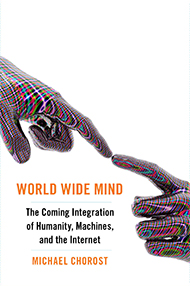In my first book, Rebuilt, I used the word “cyborg” 157 times. Rebuilt was about going completely deaf and having a computer (that is, a cochlear implant) installed in my head to make my auditory nerve transmit sound signals to my brain. The book was about what it was like to lose a part of one’s body and have it replaced with silicon circuitry. It came out in 2005, and did well; one reviewer called Rebuilt “the first cyborg memoir.”
In my second book, World Wide Mind, I used the word “cyborg” only once. Yet World Wide Mind is even more about human-machine fusions than Rebuilt. It’s about the possibility of communicating directly from one brain to another using implanted devices. I wrote at length about exotic emerging technologies like optogenetics, which reveals and controls neural activity in unprecedented detail. Optogenetics has already transformed how neuroscientists study the brain.
So why did I use the word “cyborg” only once? The simple answer is that I needed the word for my first book. When I got to my second, I didn’t need it anymore.
A few weeks after I went deaf, my audiologist handed me a cochlear implant that had been opened up so that the circuitry was visible. It was shocking. This thing, this circuit board, this maze of chips and wires and resistors, was going to go inside my head. Permanently. That was scary enough, but what was even more intimidating was knowing that it would forever change the way I perceived the world. It wouldn’t give me normal hearing. It wouldn’t even give me back the poor and partial hearing I’d had since birth. Things would sound completely different in a way that no one could describe to me. Read on...

Speak Your Mind